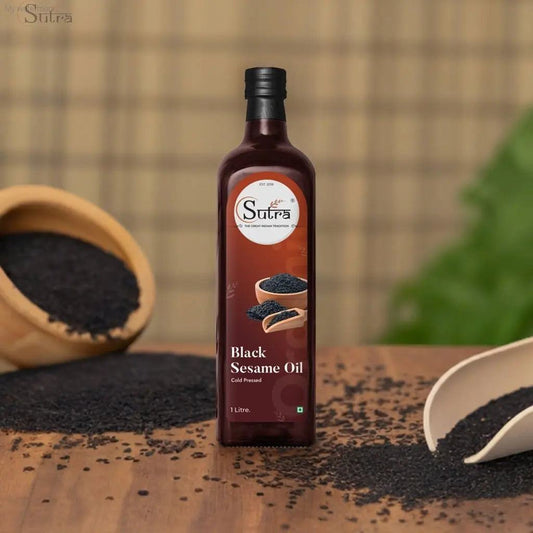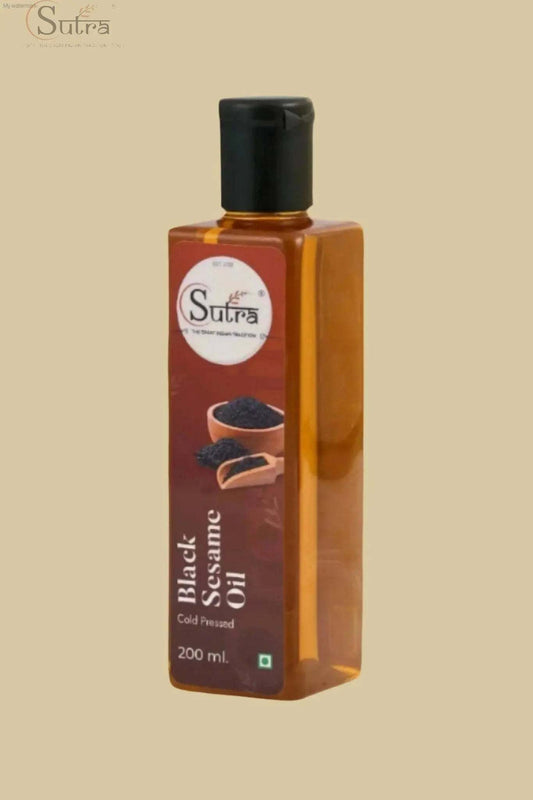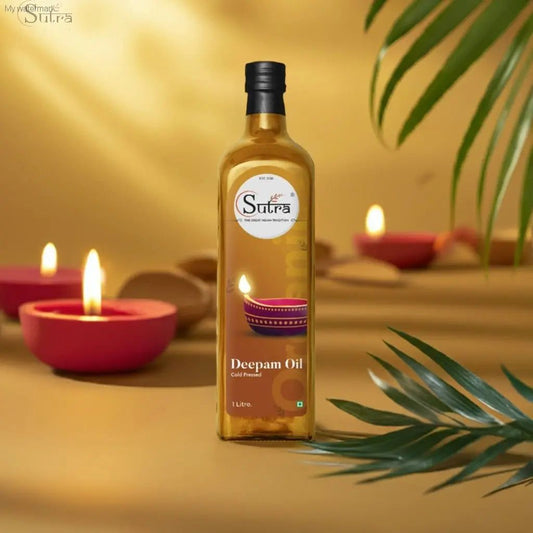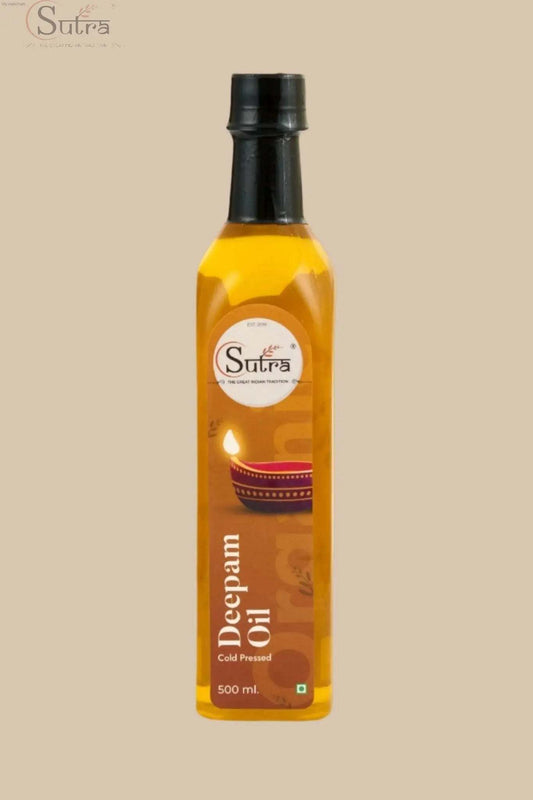The Traditional Art of Wood Pressed Oils: A Legacy of Health
-
Cold Pressed Gingelly Oil (Black Sesame Seed Oil) – Ayurvedic Til Oil
Vendor:Ecovale India Private LimitedRegular price From Rs. 173.00Regular priceUnit price perRs. 216.00Sale price From Rs. 173.00Sale -
Pancha Deepam Oil / Traditional Lamp Oil – For Auspicious Lighting & Positive Energy
Vendor:Ecovale India Private LimitedRegular price From Rs. 135.00Regular priceUnit price perRs. 135.00Sale price From Rs. 135.00
The Traditional Art of Wood Pressed Oils: A Legacy of Health
Uncover the ancient wisdom and profound heritage behind wood pressed oils. Delve into how traditional, low-heat extraction methods meticulously preserve the raw goodness and authentic flavor of these exceptional natural edible oils. By embracing this age-old craft, we ensure they remain truly healthy cooking oils, a legacy of health passed down through generations.

What Exactly are Wood Pressed Oils? Connecting to Ancient Roots
Wood pressed oils represent a culinary and health tradition that predates modern industrial processing by centuries. The term refers to oils extracted using traditional wooden mills, often known as 'Ghani' or 'Kolhu' in India, or similar traditional presses globally. In this method, oilseeds (like groundnut, sesame, or coconut) are placed in a large, cylindrical wooden churner. A heavy wooden pestle, powered traditionally by bullocks and more recently by slow-moving motors, rotates inside, gradually crushing and pressing the seeds.
The key characteristic of this method, and what makes it superior, is the incredibly low heat generated during the extraction. Unlike modern metal expellers that create significant friction and heat, the porous nature of wood absorbs most of the heat produced. This ensures that the temperature of the oil remains well below the critical threshold (typically below 49°C / 120°F) at which delicate nutrients and volatile compounds begin to degrade. Thus, wood pressed oils are essentially a form of cold pressed oils, often considered the gold standard for purity and nutritional integrity.
The Unparalleled Benefits of Traditional Wood Pressing
The gentle nature of the wood pressing process translates directly into a multitude of benefits for the final oil, making it a truly exceptional choice for your health and palate:
- Maximized Nutrient Retention: The most significant advantage. Vitamins (especially fat-soluble Vitamin E), antioxidants (like lignans, polyphenols), phospholipids, and essential fatty acids (Omega-3, 6, 9) are highly sensitive to heat. Wood pressing ensures these delicate compounds remain intact, delivering a richer, more potent oil.
- Authentic Flavor and Aroma: Without the stripping effects of high heat and chemical deodorization, wood pressed oils retain the full, natural flavor and captivating aroma of the original seed. This adds unparalleled depth and character to your cooking.
- 100% Pure and Natural: The absence of chemical solvents, bleaching agents, or artificial additives means you're consuming a truly unadulterated product. There are no trace chemical residues, just pure, wholesome oil.
- Enhanced Bioavailability: The natural state of the oil, with its molecular structure undisturbed, often means it's easier for your body to recognize, digest, and absorb the beneficial nutrients.
- Supports Traditional Craftsmanship: Choosing wood pressed oils helps sustain ancient artisanal skills and local economies, preserving a valuable cultural heritage.
- Eco-Friendly: Often associated with smaller scale, sustainable production, this method typically has a lower environmental footprint compared to large-scale industrial refining.
The Process: From Seed to Pure Oil, the Wood Pressed Way
The making of wood pressed oils is a labor of love, a testament to patience and traditional wisdom. Here's a simplified look at the steps involved:
- Careful Seed Selection: Only the finest quality, often organically grown, oilseeds (e.g., groundnuts, sesame seeds, coconuts, sunflower seeds) are chosen.
- Cleaning and Preparation: The seeds are thoroughly cleaned to remove any impurities, dust, or debris. Some seeds might be lightly sun-dried, but never roasted or highly heated.
- The Ghani/Kolhu Operation: The cleaned seeds are fed into the wooden Ghani. A heavy wooden pestle slowly rotates, crushing and pressing the seeds. The slow rotational speed is crucial in generating minimal heat.
- Natural Oil Separation: As the seeds are crushed, the oil naturally separates from the fibrous meal (oil cake). No external heat is applied, and no water or chemicals are added to aid extraction.
- Filtration (Optional, Minimal): The extracted oil may undergo a very light, natural filtration to remove larger suspended particles, often using cloth filters. This is done without chemicals or excessive pressure to maintain the oil's integrity.
- Storage: The pure, unrefined oil is then carefully bottled, ideally in dark glass bottles, and stored in a cool, dark place to protect its delicate nutrients from light and heat.
This hands-on, meticulous process ensures that every bottle of wood pressed oil is a testament to purity and a vibrant expression of the seed's natural goodness.
Why Sutra Embraces Wood Pressed Oils for Your Health
At Sutra, our philosophy aligns perfectly with the ancient wisdom of wood pressed oils. We are deeply committed to providing you with truly healthy cooking oils that form the cornerstone of a wholesome diet. By offering authentic wood pressed varieties, we ensure:
- Uncompromising Purity: Our oils are exactly as nature intended – free from any chemical residues, artificial flavors, or synthetic additives.
- Superior Nutritional Value: You receive the full spectrum of beneficial fatty acids, vitamins, and antioxidants that are often lost in industrial refining.
- Rich, Authentic Flavor: Experience the true taste of the seeds, adding unparalleled depth and aroma to your culinary creations.
- Support for Traditional Methods: We actively promote and sustain the invaluable traditional methods of oil extraction, ensuring that this legacy of health continues.
Choosing Sutra wood pressed oils means making a conscious decision to nourish your body with pure, natural goodness, just as generations before us have done.
Ready to experience the pure taste and profound health benefits of tradition? Explore Sutra's range of Wood Pressed Oils today!
Frequently Asked Questions (FAQs) About Wood Pressed Oils
Q1: Are wood pressed oils the same as cold pressed oils?
A1: Yes, wood pressed oils are a specific and traditional type of cold pressed oil. The term "wood pressed" emphasizes the use of traditional wooden churners (like Ghani or Kolhu), which inherently ensure low-heat extraction, perfectly aligning with the principles of cold pressing.
Q2: Why is the low heat in wood pressing so important?
A2: Low heat is crucial because many vital nutrients, such as essential fatty acids, vitamins (especially Vitamin E), and antioxidants, are highly sensitive to heat. High temperatures can destroy these compounds, reducing the oil's nutritional value and potentially leading to the formation of harmful substances. Wood pressing preserves these delicate components.
Q3: Do wood pressed oils have a shorter shelf life than refined oils?
A3: Due to the absence of preservatives and the retention of natural compounds, wood pressed oils typically have a slightly shorter shelf life than highly refined oils. However, proper storage (in a cool, dark place, away from sunlight and air) can significantly extend their freshness and potency.
Q4: Can wood pressed oils be used for all types of cooking?
A4: Yes, they are highly versatile. While specific smoke points vary by oil type (e.g., wood pressed groundnut oil has a higher smoke point for frying, while wood pressed sesame oil is best for finishing), they are suitable for sautéing, dressings, baking, and even deep frying depending on the oil. They are genuinely healthy cooking oils.
Q5: Why might wood pressed oil look cloudy or have sediment?
A5: A slight cloudiness or minor sediment at the bottom of the bottle is a natural characteristic of genuine wood pressed oils. It indicates minimal processing and the retention of beneficial micro-nutrients that are often filtered out in refined oils. This is a sign of purity, not impurity.






